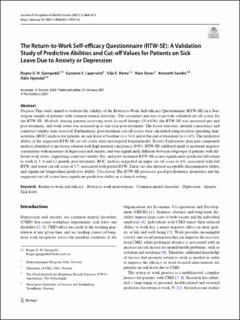The Return-to-Work Self-Efficacy Questionnaire (RTW-SE): A validation study of predictive abilities and cut-off values for patients on sick leave due to anxiety or depression.
Gjengedal, Ragne Gunnarsdatter Hole; Lagerfeld, Suzanne E.; Reme, Silje Endresen; Osnes, Kåre; Sandin, Kenneth; Hjemdal, Odin
Peer reviewed, Journal article
Published version
Permanent lenke
https://hdl.handle.net/11250/3086085Utgivelsesdato
2021Metadata
Vis full innførselSamlinger
- Institutt for psykologi [3103]
- Publikasjoner fra CRIStin - NTNU [38127]
Originalversjon
Work : A journal of Prevention, Assesment and rehabilitation. 2021, 31 (3), 664-673. 10.1007/s10926-021-09957-8Sammendrag
Purpose This study aimed to evaluate the validity of the Return-to-Work Self-efficacy Questionnaire (RTW-SE) in a Norwegian sample of patients with common mental disorders. The secondary aim was to provide validated cut-off scores for the RTW-SE. Methods Among patients receiving work-focused therapy (N = 626), the RTW-SE was measured pre-and post-treatment, and work status was assessed up to one-year post-treatment. The factor structure, internal consistency and construct validity were assessed. Furthermore, post-treatment cut-off scores were calculated using receiver operating characteristic (ROC) analysis for patients on sick leave at baseline (n = 314) and at the end of treatment (n = 145). The predictive ability of the suggested RTW-SE cut-off scores were investigated longitudinally. Results Exploratory principal component analysis identified a one-factor solution with high internal consistency (0.91). RTW-SE exhibited small to moderate negative correlations with measures of depression and anxiety, and was significantly different between subgroups of patients with different work status, supporting construct validity. Pre- and post-treatment RTW-SE scores significantly predicted full return to work at 3, 6 and 12 months post-treatment. ROC analysis suggested an upper cut-off score of 4.6, associated with full RTW, and lower cut-off score of 3.7, associated with partial RTW. These cut-offs showed acceptable discriminative ability and significant longitudinal predictive ability. Conclusion The RTW-SE possesses good psychometric properties and the suggested cut-off scores have significant predictive ability in a clinical setting.

